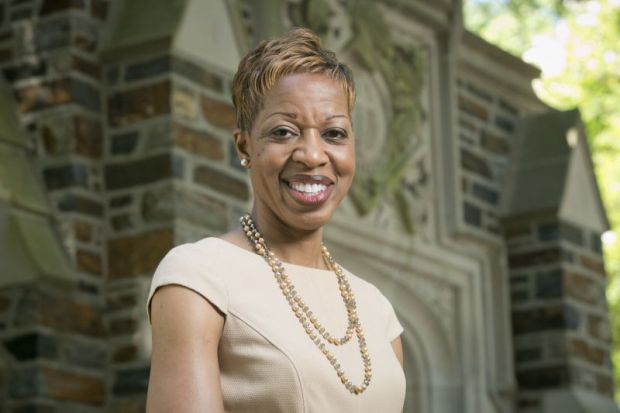Improving diversity among scientists will require universities to do more to identify and support ethnic minority graduates with the potential to do a PhD, one of the US’ most senior black academic leaders has said.
Valerie Ashby, dean of Trinity College of Arts and Sciences at North Carolina’s Duke University, told Times Higher Education that science departments needed to be more “intentional” about finding talent from under-represented groups and had to begin the process much earlier than they did for other students.
Professor Ashby, who joined Duke in 2015 from the University of North Carolina at Chapel Hill, said that she had asked senior academics to find students from under-represented groups with the ability to do a doctorate.
“We have to be more intentional – we have recommended to some of our science departments [that they] take a look at graduate students, those in the fourth and fifth years, and start earlier [in identifying talent among minority students],” Professor Ashby said. This process needed to begin “earlier than one might think you would need to for normal faculty”, she added.
Professor Ashby’s call comes amid continuing concern over the low numbers of black academics at top US universities, with the proportion of black faculty at the nation’s traditionally white institutions standing at 4 per cent, according to a 2012 National Center for Education Statistics report.
Professor Ashby insisted that Duke’s record on diversity was better than that of other world-class universities, highlighting that four of the 15 most recently hired academics at Trinity College had been African American.
“[That] is pretty good, but we still want to do better, and those faculty who just came in…must find an environment in which they are encouraged, supported and valued,” she said.
Creating a cohort of black PhD students was also crucial, insisted Professor Ashby, citing a National Science Foundation project on diversity that she led at UNC.
“One of the key lessons is that under-represented students need a strong cohort – one or two students are not a cohort; you need a critical mass,” she said.
Students from under-represented groups tended to need more advice to navigate the PhD process successfully, Professor Ashby said.
“They are intellectually quite capable, but these students are generally the first in their families to go through a doctoral education, which is not a trivial thing for any student,” she said.
“You have to have mentoring so they can avoid missteps that can derail a PhD – it could be something as trivial as not knowing how to talk to your supervisor before an oral exam or not knowing when to publish,” she added.
Professor Ashby’s NSF project at UNC helped to lift PhD completion rates for under-represented groups from about 60 per cent to 85 per cent by providing bespoke help.
Having women and minorities in senior positions – Duke’s academic leadership is unusually diverse for an elite university – also encourages ethnic minority students to consider an academic career, she added.
“All my mentors were men – four white and one African American – so I was totally fine with that,” she explained. “But when I stepped on campus at Duke, I realised that people cared that I was a woman, an African American and a scientist. I have had so many students from under-represented groups approach me to talk about academia – it seems there is a lower barrier as they feel I can relate to their situation.”
Register to continue
Why register?
- Registration is free and only takes a moment
- Once registered, you can read 3 articles a month
- Sign up for our newsletter
Subscribe
Or subscribe for unlimited access to:
- Unlimited access to news, views, insights & reviews
- Digital editions
- Digital access to THE’s university and college rankings analysis
Already registered or a current subscriber? Login








